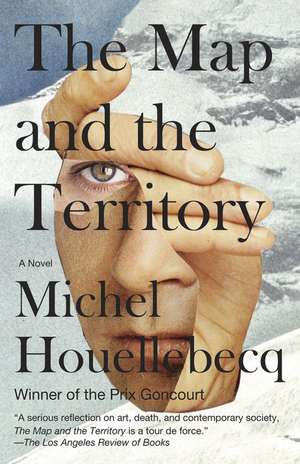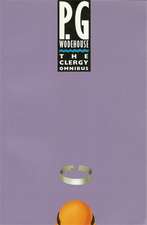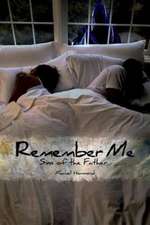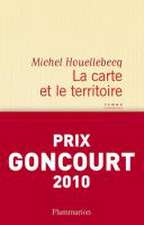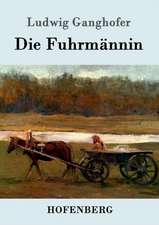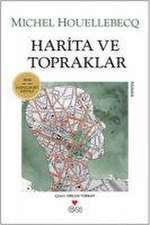The Map and the Territory
Autor Michel Houellebecq Traducere de Gavin Bowden Limba Engleză Paperback – 12 noi 2012
Jed Martin is an artist. His first photographs feature Michelin road maps, and global success arrives with his series on professions: portraits of various personalities, including a writer named Houellebecq. Not long afterward, Jed helps a police inspector solve a heinous crime that leaves lasting marks on everyone involved. But after burying his father and growing old himself, Jed also discovers serenity, a deeply moving conclusion to a life of lovers, friends, and family, and filled with hopes, losses, and dreams.
| Toate formatele și edițiile | Preț | Express |
|---|---|---|
| Paperback (2) | 53.36 lei 22-33 zile | +19.40 lei 7-13 zile |
| Vintage Publishing – 7 iun 2012 | 53.36 lei 22-33 zile | +19.40 lei 7-13 zile |
| Vintage International – 12 noi 2012 | 98.37 lei 3-5 săpt. |
Preț: 98.37 lei
Nou
Puncte Express: 148
Preț estimativ în valută:
18.82€ • 20.13$ • 15.69£
18.82€ • 20.13$ • 15.69£
Carte disponibilă
Livrare economică 27 martie-10 aprilie
Preluare comenzi: 021 569.72.76
Specificații
ISBN-13: 9780307946539
ISBN-10: 0307946533
Pagini: 269
Dimensiuni: 135 x 203 x 21 mm
Greutate: 0.29 kg
Editura: Vintage International
ISBN-10: 0307946533
Pagini: 269
Dimensiuni: 135 x 203 x 21 mm
Greutate: 0.29 kg
Editura: Vintage International
Recenzii
Praise for The Map and the Territory:
Winner of the 2010 Prix Goncourt
“A serious reflection on art, death, and contemporary society, The Map and the Territory is a tour de force.”—The Los Angeles Review of Books
"Powerful. . . . [A] singular novel. . . . Archly sarcastic, cheerily pedantic, willfully brutal." —The New York Times Book Review
“An ingenious and engaging composite of künstlerroman and police procedural; a novel of ideas; and an authorial self-reflection." ߝThe Boston Globe
"All novelists everywhere have benefited from [Houellebecq's] audacity. . . . his temerity has recharged the form and reminded people what the novel can do." --The Sunday Times
“Funny, astonishing and authoritative. . . . This is the brilliant and controversial French writer’s most intellectually ambitious book..” —The Guardian
“Beautifully, accurately translated . . . . If ever there was a novelist for our globally dysfunctional times it’s Michel Houellebecq. . . . Long cast aside as the bad boy of books, [his] latest novel has seen him brought in from the cold, and embraced by the literary establishment for what he’s always been ߝ not much short of a genius.” —The Mirror
“One of the most important facts about Michel Houellebecq . . . is that he is a first-rate prose stylist. . . . Teasing and entertaining. . . . A page turner.” —Literary Review
"Houellebecq's bewitching journey on the river of art to the cave of death and decay is a tale of eviscerating insight, caustic humor, troubling beauty, and haunting provocation." ߝBooklist
"[Houellebecq is] a trenchant, sharp-tongued social commentator.”—Bookforum
“Very likely his best [book] ever, a serious novel about aging and death that also employs its author’s trademark lugubrious wit towards some delicious exercises in satire and self-parody. . . . Challenging, mature and highly intelligent.” —The Daily Telegraph
“A dark master of invention. . . . In a world of copycatting and fakery, Michel Houellebecq is an exceptional writer and a stand-out original.” —Evening Standard
“An astonishing writer. . . . The Map and the Territory is funny, shocking, brutal and unbearably poignant. . . . Sublime.” —Scotland on Sunday
Winner of the 2010 Prix Goncourt
“A serious reflection on art, death, and contemporary society, The Map and the Territory is a tour de force.”—The Los Angeles Review of Books
"Powerful. . . . [A] singular novel. . . . Archly sarcastic, cheerily pedantic, willfully brutal." —The New York Times Book Review
“An ingenious and engaging composite of künstlerroman and police procedural; a novel of ideas; and an authorial self-reflection." ߝThe Boston Globe
"All novelists everywhere have benefited from [Houellebecq's] audacity. . . . his temerity has recharged the form and reminded people what the novel can do." --The Sunday Times
“Funny, astonishing and authoritative. . . . This is the brilliant and controversial French writer’s most intellectually ambitious book..” —The Guardian
“Beautifully, accurately translated . . . . If ever there was a novelist for our globally dysfunctional times it’s Michel Houellebecq. . . . Long cast aside as the bad boy of books, [his] latest novel has seen him brought in from the cold, and embraced by the literary establishment for what he’s always been ߝ not much short of a genius.” —The Mirror
“One of the most important facts about Michel Houellebecq . . . is that he is a first-rate prose stylist. . . . Teasing and entertaining. . . . A page turner.” —Literary Review
"Houellebecq's bewitching journey on the river of art to the cave of death and decay is a tale of eviscerating insight, caustic humor, troubling beauty, and haunting provocation." ߝBooklist
"[Houellebecq is] a trenchant, sharp-tongued social commentator.”—Bookforum
“Very likely his best [book] ever, a serious novel about aging and death that also employs its author’s trademark lugubrious wit towards some delicious exercises in satire and self-parody. . . . Challenging, mature and highly intelligent.” —The Daily Telegraph
“A dark master of invention. . . . In a world of copycatting and fakery, Michel Houellebecq is an exceptional writer and a stand-out original.” —Evening Standard
“An astonishing writer. . . . The Map and the Territory is funny, shocking, brutal and unbearably poignant. . . . Sublime.” —Scotland on Sunday
Notă biografică
Already honored with the Prix Novembre and the International IMPAC Dublin Literary Award, Michel Houellebecq won the Prix Goncourt for The Map and the Territory in 2010.
Extras
Jeff Koons had just got up from his chair, enthusiastically throwing his arms out in front of him. Sitting opposite him, slightly hunched up, on a white leather sofa partly draped with silks, Damien Hirst seemed to be about to express an objection; his face was flushed, morose. Both of them were wearing black suits—Koons’s had fine pinstripes—and white shirts and black ties. Between them, on the coffee table, was a basket of candied fruits that neither paid any attention to. Hirst was drinking a Bud Light.
Behind them, a bay window opened onto a landscape of tall buildings that formed a Babylonian tangle of gigantic polygons that stretched across the horizon. The night was bright, the air absolutely clear. They could have been in Qatar, or Dubai; the decoration of the room was, in reality, inspired by an advertisement photograph, taken from a German luxury publication, of the Emirates Palace Hotel in Abu Dhabi.
Koons’s forehead was slightly shiny. Jed shaded it with his brush and stepped back three paces. There was certainly a problem with Koons. Hirst was basically easy to capture: you could make him brutal, cynical in an “I shit on you from the top of my pile of cash” kind of way; you could also make him a rebel artist (but rich all the same) pursuing an anguished work on death; finally, there was in his face something ruddy and heavy, typically English, which made him look like a rank-and-file Arsenal supporter. In short, there were various aspects to him, but all of them could be combined into a coherent, representative portrait of a British artist typical of his generation. Koons, on the other hand, seemed to have a duality, an insurmountable contradiction between the basic cunning of the technical sales rep and the exaltation of the ascetic. It was already three weeks now that Jed had been retouching Koons’s expression as he stood up from his chair, throwing out his arms as if he were trying to convince Hirst of something. It was as difficult as painting a Mormon pornographer.
He had photographs of Koons on his own, in the company of Roman Abramovich, Madonna, Barack Obama, Bono, Warren Buffett, Bill Gates... Not one of them managed to express anything of the personality of Koons, to go beyond the appearance of a Chevrolet convertible salesman that he had decided to display to the world, and this was exasperating. In fact, for a long time photographers had exasperated Jed, especially the great photographers, with their claim to reveal in their snapshots the truth of their models. They didn’t reveal anything at all, just placed themselves in front of you and switched on the motor of their camera to take hundreds of random snapshots while chuckling, and later chose the least bad of the lot; that’s how they proceeded, without exception, all those so-called great photographers. Jed knew some of them personally and had nothing but contempt for them; he considered them all about as creative as a Photomaton.
In the kitchen, a few steps behind him, the boiler uttered a succession of loud banging noises. It went rigid, paralyzed. It was already 15 December.
One year before, on almost the same date, his boiler had uttered the same succession of banging noises before stopping completely. In a few hours, the temperature in the studio had fallen to thirty-seven degrees. He had managed to sleep a little, or rather doze off, for brief periods. Around six in the morning, he had emptied the hot-water tank to wash himself quickly, then had brewed coffee while waiting for the man from Plumbing in General, who had promised to send someone in the early hours of the morning.
On its Web site, Plumbing in General offered to “make plumbing enter the third millennium”; they could at least start by turning up on time, grumbled Jed at about eleven, pacing around his studio in a vain attempt to warm himself up. He was then working on a painting of his father, which he was going to entitle The Architect Jean-Pierre Martin Leaving the Management of His Business; inevitably, the drop in temperature meant that the last layer of paint would take an age to dry. He had agreed, as he did every year, to dine with his father on Christmas Eve, two weeks hence, and hoped to have finished it by then; if a plumber didn’t intervene quickly, his plan risked being compromised. To tell the truth, in absolute terms, it wasn’t that important: he didn’t intend to offer this painting to his father as a gift; he wanted simply to show it to him. Why, then, was he suddenly attaching so much importance to it? He was at the end of his tether; he was working too hard, had started six paintings simultaneously. For a few months he hadn’t stopped. It wasn’t sensible.
At around three in the afternoon, he decided to call Plumbing in General again, but the line was constantly engaged. He managed to get through to them just after five, when the customer-service secretary explained that there had been an exceptional workload due to the frigid weather, but promised that someone would certainly come the following morning. Jed hung up, then reserved a room in the Mercure Hotel on the boulevard Auguste-Blanqui.
He waited all of the following day for the arrival of Plumbing in General, but also for Simply Plumbers, whom he had managed to contact in the meantime. While Simply Plumbers promised to respect the craft traditions of “higher plumbing,” they showed themselves to be no more capable of turning up on time.
In the painting he had made of him, Jed’s father, standing on a podium in the middle of the group of about fifty employees that made up his business, was lifting his glass with a sorrowful smile. The farewell party took place in the open space of his architectural practice, a large room thirty meters by twenty with white walls and a skylight, under which computer design posts alternated with trestle tables carrying the scale models of current projects. Most of those present were nerdy-looking young people—the 3-D designers. Standing at the foot of the podium, three fortysomething architects surrounded his father. In accordance with a configuration borrowed from a minor painting by Lorenzo Lotto, each of them avoided the eyes of the others, while trying to catch those of his father; each of them, you understood right away, nurtured the hope of succeeding him as the head of the business. His father’s eyes, staring just above those present, expressed the desire to gather his team around him for one last time, and a reasonable confidence in the future, but also an absolute sadness. Sadness at leaving the business he had founded, to which he had given all his strength, and sadness at the inevitable: you were quite obviously dealing with a finished man.
In the middle of the afternoon, Jed tried in vain, a dozen times, to get through to Ze Plumb, who used Skyrock Radio as its hold music, while Simply Plumbing had opted for the radio station Laughter and Songs.
At about five, he returned to the Mercure Hotel. Night was falling on the boulevard Auguste-Blanqui; some homeless people had lit a fire on one side of the street.
The subsequent days passed more or less in the same way: dialing numbers of plumbing businesses, being redirected almost instantaneously to on-hold music, waiting, as it got colder and colder, next to his painting, which refused to dry.
A solution came on the morning of 24 December, in the form of a Croatian workman who lived nearby on the avenue Stephen-Pichon; Jed had noticed his sign by accident while returning from the Mercure Hotel. He was available, yes, immediately. He was a small man with black hair and a pale complexion, harmonious and fine features, and a rather Belle Époque mustache; in fact, he looked a bit like Jed—apart from the mustache.
Immediately after entering the flat, he examined the boiler for a long time, dismantling the control panel, running his slender fingers along the complex trail of pipes. He spoke of valves and siphons. He gave the impression of knowing a lot about life in general.
After a quarter of an hour, his diagnosis was the following: he could repair, yes, he could do a sort of repair that would come to fifty euros, no more. But it would be less than a genuine repair job, only a makeshift one, really, that would do the trick for a few months, even a few years in the best-case scenario, but he refused to give any long-term guarantee; more generally, it was unseemly to make a long-term bet on this boiler.
Jed sighed and confessed he had half expected it. He remembered very well the day when he had decided to buy this flat; he could still see the estate agent, stocky and self-satisfied, boasting of the exceptional light, but not hiding the need for certain “improvements.” He had then told himself that he should have become an estate agent, or a gynecologist.
Barely amiable in the first few minutes, the stocky estate agent went into a lyrical trance when he learned that Jed was an artist. It was the first time, he exclaimed, that he’d had the opportunity to sell an artist’s studio to an artist! Jed feared for a moment that he would declare his solidarity with authentic artists against the bourgeois bohemians and other such philistines who inflated prices, thus making artist’s studios inaccessible to artists, but what can you do? I can’t go against the truth of the market: it’s not my role. But fortunately this did not happen. The stocky estate agent just offered him a ten percent discount—which he had probably already foreseen offering after a mini-negotiation.
“Artist’s studio” really meant an attic with a skylight—a very nice one, it must be said—and a few dark adjoining spaces, scarcely insufficient for someone like Jed, who had very limited hygienic needs. But the view was, indeed, splendid: beyond the place des Alpes it extended as far as the boulevard Vincent-Auriol and the aboveground Métro, and farther on to those quadrangular buildings built in the mid-seventies that were in complete opposition to the rest of the Parisian aesthetic landscape, and which were what Jed preferred in Paris, by far, in terms of architecture.
The Croat did the repair job and pocketed the fifty euros. He didn’t offer an invoice, and Jed hadn’t expected one. The door had just closed behind him when he knocked again very gently. Jed opened the door slightly.
“By the way, monsieur,” said the man. “Merry Christmas. I wanted to say to you: Merry Christmas.”
“Yes, I’d forgotten,” said Jed, embarrassed. “Merry Christmas to you too.”
It was then that he became aware of the problem of the taxi. As expected, ToAnywhere refused point-blank to drive him to Le Raincy, and Speedtax agreed to take him to the railway station, or, at a pinch, as far as the town hall, but certainly not near the Cicadas housing complex. “Security reasons, monsieur,” whispered the employee with a slight reproach in his voice. “We only serve completely safe zones, monsieur,” said the receptionist for Fernand Garcin Cars with smooth self-importance. Jed felt more and more guilty about wanting to spend Christmas Eve in such an incongruous place and, as happened every year, began to get angry with his father, who obstinately refused to quit that bourgeois house, surrounded by a vast park, that population movements had gradually relegated to the heart of a zone that got ever more dangerous, and which had recently fallen under the complete control of gangs.
First, the perimeter wall had needed to be reinforced and topped with an electrified fence, then a CCTV system linked to the police station was installed, all so his father could wander alone in twelve rooms that were impossible to heat and where no one came except Jed, every Christmas Eve. The nearby shops had long since closed, and it was impossible to walk around the neighboring streets, since even attacks on cars stopped at traffic lights were not unheard of. The Raincy Council had given him a home-care aide—a cantankerous and nasty Senegalese woman called Fatty who had disliked him from the start, refused to change the sheets more than once a month, and most probably stole from the shopping allowance.
Be that as it may, the temperature was rising slowly in the room. Jed took a photo of the painting in progress, which would at least give him something to show his father. He took off his trousers and his pullover, sat down cross-legged on the narrow mattress on the floor that served as his bed, and wrapped himself in a blanket. Gradually, he slowed the rhythm of his breathing. He visualized waves rolling slowly, lazily, beneath a matte twilight. He tried to lead his mind to a place of calm, and prepare himself as best he could for another Christmas Eve with his father.
This mental preparation bore fruit, and the following evening was a zone of neutral time, even semi-convivial; he had hoped for nothing more.
The next morning, at about seven, assuming that the gangs too had celebrated Christmas, Jed walked to Raincy Station and got back to the Gare de l’Est without a hitch.
One year on, the boiler repair had held, and this was the first time that it had shown signs of weakness. The Architect Jean-Pierre Martin Leaving the Management of His Business had been finished for some time and put into storage by Jed’s gallerist in anticipation of a solo exhibition that was taking a while to organize. Jean-Pierre Martin himself—to the surprise of his son, who had long since given up talking to him about it—had decided to leave the house in Le Raincy and move into a nursing home in Boulogne. Their annual meal would this time take place in a brasserie on the avenue Bosquet called Chez Papa. Jed had chosen it on the strength of an ad in Pariscope promising traditional quality, à l’ancienne, and this promise was, on the whole, kept. Some Father Christmases and trees decorated with tinsel sprinkled the half-empty room, essentially occupied by small groups of old people, some very old, who chewed carefully, consciously, and even ferociously on dishes of traditional cuisine. There were wild boar, suckling pig, and turkey; for dessert, of course, a patisserie Yule log à l’ancienne was proposed by the house, whose polite and discreet waiters operated in silence, as if in a burn unit. Jed had been a bit stupid, he realized, to offer his father such a meal. This dry, serious man, with a long and austere face, never seemed to have been taken by the pleasures of the table, and the rare times Jed had dined out with him, when he had needed to see him near his place of work, his father had chosen a sushi restaurant—always the same one. It was pathetic and vain to want to establish a gastronomical conviviality that had no raison d’être, and which had not even conceivably ever had one—his mother, while she was alive, had always hated cooking. But it was Christmas, and what else could you do? His father didn’t seem interested in much anymore; he read less and less, and was utterly indifferent to questions of dress. He was, according to the director of the nursing home, “reasonably integrated,” which probably meant that he hardly said a word to anyone. For the time being, he chewed laboriously on his suckling pig, with about the same expression as if it were a piece of rubber; nothing indicated that he wanted to break the lengthening silence, and Jed, being nervous (he should never have drunk Gewürztraminer with the oysters—he’d realized that from the moment he had ordered, since white wine always made his mind fuzzy), looked frenetically for some subject that might lend itself to conversation. If he had been married, or at least had a girlfriend, well, some kind of woman, things would have happened very differently. Women are generally more at ease with these family affairs, it’s sort of their basic specialty; even in the absence of real children, they are there, potentially, on the edge of the conversation, and it is a known fact that old people are interested in their grandchildren, whom they link to natural cycles or something. There’s a sort of emotion that manages to be born in their old heads: the son is the death of the father, certainly, but for the grandfather the grandson is a sort of rebirth or revenge, and that can be largely sufficient, at least for the duration of a Christmas dinner. Jed sometimes thought that he should hire an escort for these Christmas Eves, create a sort of mini-fiction; it would be enough to brief the girl a couple of hours beforehand; his father wasn’t very curious about the details of the lives of others, no more than men in general.
In Latin countries, politics is enough for the conversational needs of middle- or old-aged males; it is sometimes replaced in the lower classes by sports. Among people particularly influenced by Anglo-Saxon values, politics is supplanted by economics and finance; literature can provide backup. But neither Jed nor his father had any real interest in economics, or politics for that matter. Jean-Pierre Martin approved overall of the way in which the country was led, and his son didn’t have an opinion; however, by reviewing each ministry in turn they at least managed to keep the conversation going until the cheese trolley arrived.
During the cheese course, Jed’s father got slightly animated and asked him about his projects. Unfortunately, this time it was Jed who risked spoiling the atmosphere, because since his last painting, Damien Hirst and Jeff Koons Dividing Up the Art Market, he no longer felt much about art. He was going nowhere. There was a sort of force that had carried him for a year or two but was now dissipating, crumbling, but what was the point of saying all that to his father, who could do nothing about it? To tell the truth, no one could; when faced with such a confession, people could only be slightly sad. They don’t really amount to much, anyway, human relationships.
“I’m preparing a solo exhibition in the spring,” he finally announced. “Well, in fact it’s dragging on a bit. Franz, my gallerist, wants a writer for the catalogue. He thought of Houellebecq.”
“Michel Houellebecq?”
“Do you know him?” asked Jed, surprised. He would never have suspected that his father was still interested in anything cultural.
“There’s a small library in the nursing home; I’ve read two of his novels. He’s a good author, it seems to me. He’s pleasant to read, and he has quite an accurate view of society. Has he agreed to do it?”
“No, not yet...” Jed was now thinking as fast as he could. If someone as deeply paralyzed in such a hopeless and mortal routine, someone as far down the path of darkness, down the Valley of the Shadow of Death, as his father was had noticed Houellebecq’s existence, it was because there had to be something compelling about this author. He then remembered that he had failed to get in touch with Houellebecq by e-mail, as Franz had asked him to do several times already. And time was pressing. Given the date of Art Basel and the Frieze Art Fair, the exhibition had to be organized by April, or May at the latest, and you could hardly ask Houellebecq to write a catalogue text in a fortnight. He was a famous writer, world-famous even, at least according to Franz.
His father’s excitement had subsided, and he was chewing his Saint-Nectaire with as little enthusiasm as he had the suckling pig. It’s no doubt through compassion that we imagine old people have a particularly good appetite, because we like to think that at least they have that left, when in the majority of cases the enjoyment of taste disappears irredeemably, along with the rest. Digestive problems and prostate cancer remain.
A few meters to their left, three octogenarian women seemed to be praying over their fruit salad—perhaps in homage to their dead husbands. One of them reached out toward her glass of champagne, then her hand fell onto the table; her chest was heaving. After a few seconds she tried again, her hand shaking terribly, her face screwed up in concentration. Jed restrained himself from intervening, being in no position to help. Neither was the waiter, on duty only steps away, watching the situation carefully. This woman was now in direct contact with God. She was probably closer to ninety than eighty.
To go through all the motions, desserts were then served in turn. With resignation, Jed’s father attacked his traditional Yule log. There wasn’t much longer to go. Time passed bizarrely between them: although nothing was said, and the silence now permanently established over the table should have given the sensation of total gravity, it seemed that the seconds, and even the minutes, flowed with astonishing speed. Half an hour later, without even a thought really crossing his mind, Jed accompanied his father back to the taxi stand. It was only ten, but Jed knew that the other residents of the retirement home already deemed his father lucky: to have someone, for a few hours, to celebrate Christmas with. “You have a good son...” This had been pointed out to him, several times. On entering the nursing home, the former head of the family—now, irrefutably, an old man—becomes a bit like a child at boarding school. Sometimes, he receives visits: then it’s happiness, he can discover the world, eat at Pepitos and meet Ronald McDonald. But more often, he doesn’t receive any; he wanders around sadly, between the handball goalposts, on the bituminous ground of the deserted boarding school. He waits for liberation, an escape from all of it.
Back in his studio, Jed noticed that the boiler was still working, the temperature normal, even warm. He got partly undressed before stretching out on his mattress and falling asleep immediately, his brain completely empty.
From the Hardcover Edition
Behind them, a bay window opened onto a landscape of tall buildings that formed a Babylonian tangle of gigantic polygons that stretched across the horizon. The night was bright, the air absolutely clear. They could have been in Qatar, or Dubai; the decoration of the room was, in reality, inspired by an advertisement photograph, taken from a German luxury publication, of the Emirates Palace Hotel in Abu Dhabi.
Koons’s forehead was slightly shiny. Jed shaded it with his brush and stepped back three paces. There was certainly a problem with Koons. Hirst was basically easy to capture: you could make him brutal, cynical in an “I shit on you from the top of my pile of cash” kind of way; you could also make him a rebel artist (but rich all the same) pursuing an anguished work on death; finally, there was in his face something ruddy and heavy, typically English, which made him look like a rank-and-file Arsenal supporter. In short, there were various aspects to him, but all of them could be combined into a coherent, representative portrait of a British artist typical of his generation. Koons, on the other hand, seemed to have a duality, an insurmountable contradiction between the basic cunning of the technical sales rep and the exaltation of the ascetic. It was already three weeks now that Jed had been retouching Koons’s expression as he stood up from his chair, throwing out his arms as if he were trying to convince Hirst of something. It was as difficult as painting a Mormon pornographer.
He had photographs of Koons on his own, in the company of Roman Abramovich, Madonna, Barack Obama, Bono, Warren Buffett, Bill Gates... Not one of them managed to express anything of the personality of Koons, to go beyond the appearance of a Chevrolet convertible salesman that he had decided to display to the world, and this was exasperating. In fact, for a long time photographers had exasperated Jed, especially the great photographers, with their claim to reveal in their snapshots the truth of their models. They didn’t reveal anything at all, just placed themselves in front of you and switched on the motor of their camera to take hundreds of random snapshots while chuckling, and later chose the least bad of the lot; that’s how they proceeded, without exception, all those so-called great photographers. Jed knew some of them personally and had nothing but contempt for them; he considered them all about as creative as a Photomaton.
In the kitchen, a few steps behind him, the boiler uttered a succession of loud banging noises. It went rigid, paralyzed. It was already 15 December.
One year before, on almost the same date, his boiler had uttered the same succession of banging noises before stopping completely. In a few hours, the temperature in the studio had fallen to thirty-seven degrees. He had managed to sleep a little, or rather doze off, for brief periods. Around six in the morning, he had emptied the hot-water tank to wash himself quickly, then had brewed coffee while waiting for the man from Plumbing in General, who had promised to send someone in the early hours of the morning.
On its Web site, Plumbing in General offered to “make plumbing enter the third millennium”; they could at least start by turning up on time, grumbled Jed at about eleven, pacing around his studio in a vain attempt to warm himself up. He was then working on a painting of his father, which he was going to entitle The Architect Jean-Pierre Martin Leaving the Management of His Business; inevitably, the drop in temperature meant that the last layer of paint would take an age to dry. He had agreed, as he did every year, to dine with his father on Christmas Eve, two weeks hence, and hoped to have finished it by then; if a plumber didn’t intervene quickly, his plan risked being compromised. To tell the truth, in absolute terms, it wasn’t that important: he didn’t intend to offer this painting to his father as a gift; he wanted simply to show it to him. Why, then, was he suddenly attaching so much importance to it? He was at the end of his tether; he was working too hard, had started six paintings simultaneously. For a few months he hadn’t stopped. It wasn’t sensible.
At around three in the afternoon, he decided to call Plumbing in General again, but the line was constantly engaged. He managed to get through to them just after five, when the customer-service secretary explained that there had been an exceptional workload due to the frigid weather, but promised that someone would certainly come the following morning. Jed hung up, then reserved a room in the Mercure Hotel on the boulevard Auguste-Blanqui.
He waited all of the following day for the arrival of Plumbing in General, but also for Simply Plumbers, whom he had managed to contact in the meantime. While Simply Plumbers promised to respect the craft traditions of “higher plumbing,” they showed themselves to be no more capable of turning up on time.
In the painting he had made of him, Jed’s father, standing on a podium in the middle of the group of about fifty employees that made up his business, was lifting his glass with a sorrowful smile. The farewell party took place in the open space of his architectural practice, a large room thirty meters by twenty with white walls and a skylight, under which computer design posts alternated with trestle tables carrying the scale models of current projects. Most of those present were nerdy-looking young people—the 3-D designers. Standing at the foot of the podium, three fortysomething architects surrounded his father. In accordance with a configuration borrowed from a minor painting by Lorenzo Lotto, each of them avoided the eyes of the others, while trying to catch those of his father; each of them, you understood right away, nurtured the hope of succeeding him as the head of the business. His father’s eyes, staring just above those present, expressed the desire to gather his team around him for one last time, and a reasonable confidence in the future, but also an absolute sadness. Sadness at leaving the business he had founded, to which he had given all his strength, and sadness at the inevitable: you were quite obviously dealing with a finished man.
In the middle of the afternoon, Jed tried in vain, a dozen times, to get through to Ze Plumb, who used Skyrock Radio as its hold music, while Simply Plumbing had opted for the radio station Laughter and Songs.
At about five, he returned to the Mercure Hotel. Night was falling on the boulevard Auguste-Blanqui; some homeless people had lit a fire on one side of the street.
The subsequent days passed more or less in the same way: dialing numbers of plumbing businesses, being redirected almost instantaneously to on-hold music, waiting, as it got colder and colder, next to his painting, which refused to dry.
A solution came on the morning of 24 December, in the form of a Croatian workman who lived nearby on the avenue Stephen-Pichon; Jed had noticed his sign by accident while returning from the Mercure Hotel. He was available, yes, immediately. He was a small man with black hair and a pale complexion, harmonious and fine features, and a rather Belle Époque mustache; in fact, he looked a bit like Jed—apart from the mustache.
Immediately after entering the flat, he examined the boiler for a long time, dismantling the control panel, running his slender fingers along the complex trail of pipes. He spoke of valves and siphons. He gave the impression of knowing a lot about life in general.
After a quarter of an hour, his diagnosis was the following: he could repair, yes, he could do a sort of repair that would come to fifty euros, no more. But it would be less than a genuine repair job, only a makeshift one, really, that would do the trick for a few months, even a few years in the best-case scenario, but he refused to give any long-term guarantee; more generally, it was unseemly to make a long-term bet on this boiler.
Jed sighed and confessed he had half expected it. He remembered very well the day when he had decided to buy this flat; he could still see the estate agent, stocky and self-satisfied, boasting of the exceptional light, but not hiding the need for certain “improvements.” He had then told himself that he should have become an estate agent, or a gynecologist.
Barely amiable in the first few minutes, the stocky estate agent went into a lyrical trance when he learned that Jed was an artist. It was the first time, he exclaimed, that he’d had the opportunity to sell an artist’s studio to an artist! Jed feared for a moment that he would declare his solidarity with authentic artists against the bourgeois bohemians and other such philistines who inflated prices, thus making artist’s studios inaccessible to artists, but what can you do? I can’t go against the truth of the market: it’s not my role. But fortunately this did not happen. The stocky estate agent just offered him a ten percent discount—which he had probably already foreseen offering after a mini-negotiation.
“Artist’s studio” really meant an attic with a skylight—a very nice one, it must be said—and a few dark adjoining spaces, scarcely insufficient for someone like Jed, who had very limited hygienic needs. But the view was, indeed, splendid: beyond the place des Alpes it extended as far as the boulevard Vincent-Auriol and the aboveground Métro, and farther on to those quadrangular buildings built in the mid-seventies that were in complete opposition to the rest of the Parisian aesthetic landscape, and which were what Jed preferred in Paris, by far, in terms of architecture.
The Croat did the repair job and pocketed the fifty euros. He didn’t offer an invoice, and Jed hadn’t expected one. The door had just closed behind him when he knocked again very gently. Jed opened the door slightly.
“By the way, monsieur,” said the man. “Merry Christmas. I wanted to say to you: Merry Christmas.”
“Yes, I’d forgotten,” said Jed, embarrassed. “Merry Christmas to you too.”
It was then that he became aware of the problem of the taxi. As expected, ToAnywhere refused point-blank to drive him to Le Raincy, and Speedtax agreed to take him to the railway station, or, at a pinch, as far as the town hall, but certainly not near the Cicadas housing complex. “Security reasons, monsieur,” whispered the employee with a slight reproach in his voice. “We only serve completely safe zones, monsieur,” said the receptionist for Fernand Garcin Cars with smooth self-importance. Jed felt more and more guilty about wanting to spend Christmas Eve in such an incongruous place and, as happened every year, began to get angry with his father, who obstinately refused to quit that bourgeois house, surrounded by a vast park, that population movements had gradually relegated to the heart of a zone that got ever more dangerous, and which had recently fallen under the complete control of gangs.
First, the perimeter wall had needed to be reinforced and topped with an electrified fence, then a CCTV system linked to the police station was installed, all so his father could wander alone in twelve rooms that were impossible to heat and where no one came except Jed, every Christmas Eve. The nearby shops had long since closed, and it was impossible to walk around the neighboring streets, since even attacks on cars stopped at traffic lights were not unheard of. The Raincy Council had given him a home-care aide—a cantankerous and nasty Senegalese woman called Fatty who had disliked him from the start, refused to change the sheets more than once a month, and most probably stole from the shopping allowance.
Be that as it may, the temperature was rising slowly in the room. Jed took a photo of the painting in progress, which would at least give him something to show his father. He took off his trousers and his pullover, sat down cross-legged on the narrow mattress on the floor that served as his bed, and wrapped himself in a blanket. Gradually, he slowed the rhythm of his breathing. He visualized waves rolling slowly, lazily, beneath a matte twilight. He tried to lead his mind to a place of calm, and prepare himself as best he could for another Christmas Eve with his father.
This mental preparation bore fruit, and the following evening was a zone of neutral time, even semi-convivial; he had hoped for nothing more.
The next morning, at about seven, assuming that the gangs too had celebrated Christmas, Jed walked to Raincy Station and got back to the Gare de l’Est without a hitch.
One year on, the boiler repair had held, and this was the first time that it had shown signs of weakness. The Architect Jean-Pierre Martin Leaving the Management of His Business had been finished for some time and put into storage by Jed’s gallerist in anticipation of a solo exhibition that was taking a while to organize. Jean-Pierre Martin himself—to the surprise of his son, who had long since given up talking to him about it—had decided to leave the house in Le Raincy and move into a nursing home in Boulogne. Their annual meal would this time take place in a brasserie on the avenue Bosquet called Chez Papa. Jed had chosen it on the strength of an ad in Pariscope promising traditional quality, à l’ancienne, and this promise was, on the whole, kept. Some Father Christmases and trees decorated with tinsel sprinkled the half-empty room, essentially occupied by small groups of old people, some very old, who chewed carefully, consciously, and even ferociously on dishes of traditional cuisine. There were wild boar, suckling pig, and turkey; for dessert, of course, a patisserie Yule log à l’ancienne was proposed by the house, whose polite and discreet waiters operated in silence, as if in a burn unit. Jed had been a bit stupid, he realized, to offer his father such a meal. This dry, serious man, with a long and austere face, never seemed to have been taken by the pleasures of the table, and the rare times Jed had dined out with him, when he had needed to see him near his place of work, his father had chosen a sushi restaurant—always the same one. It was pathetic and vain to want to establish a gastronomical conviviality that had no raison d’être, and which had not even conceivably ever had one—his mother, while she was alive, had always hated cooking. But it was Christmas, and what else could you do? His father didn’t seem interested in much anymore; he read less and less, and was utterly indifferent to questions of dress. He was, according to the director of the nursing home, “reasonably integrated,” which probably meant that he hardly said a word to anyone. For the time being, he chewed laboriously on his suckling pig, with about the same expression as if it were a piece of rubber; nothing indicated that he wanted to break the lengthening silence, and Jed, being nervous (he should never have drunk Gewürztraminer with the oysters—he’d realized that from the moment he had ordered, since white wine always made his mind fuzzy), looked frenetically for some subject that might lend itself to conversation. If he had been married, or at least had a girlfriend, well, some kind of woman, things would have happened very differently. Women are generally more at ease with these family affairs, it’s sort of their basic specialty; even in the absence of real children, they are there, potentially, on the edge of the conversation, and it is a known fact that old people are interested in their grandchildren, whom they link to natural cycles or something. There’s a sort of emotion that manages to be born in their old heads: the son is the death of the father, certainly, but for the grandfather the grandson is a sort of rebirth or revenge, and that can be largely sufficient, at least for the duration of a Christmas dinner. Jed sometimes thought that he should hire an escort for these Christmas Eves, create a sort of mini-fiction; it would be enough to brief the girl a couple of hours beforehand; his father wasn’t very curious about the details of the lives of others, no more than men in general.
In Latin countries, politics is enough for the conversational needs of middle- or old-aged males; it is sometimes replaced in the lower classes by sports. Among people particularly influenced by Anglo-Saxon values, politics is supplanted by economics and finance; literature can provide backup. But neither Jed nor his father had any real interest in economics, or politics for that matter. Jean-Pierre Martin approved overall of the way in which the country was led, and his son didn’t have an opinion; however, by reviewing each ministry in turn they at least managed to keep the conversation going until the cheese trolley arrived.
During the cheese course, Jed’s father got slightly animated and asked him about his projects. Unfortunately, this time it was Jed who risked spoiling the atmosphere, because since his last painting, Damien Hirst and Jeff Koons Dividing Up the Art Market, he no longer felt much about art. He was going nowhere. There was a sort of force that had carried him for a year or two but was now dissipating, crumbling, but what was the point of saying all that to his father, who could do nothing about it? To tell the truth, no one could; when faced with such a confession, people could only be slightly sad. They don’t really amount to much, anyway, human relationships.
“I’m preparing a solo exhibition in the spring,” he finally announced. “Well, in fact it’s dragging on a bit. Franz, my gallerist, wants a writer for the catalogue. He thought of Houellebecq.”
“Michel Houellebecq?”
“Do you know him?” asked Jed, surprised. He would never have suspected that his father was still interested in anything cultural.
“There’s a small library in the nursing home; I’ve read two of his novels. He’s a good author, it seems to me. He’s pleasant to read, and he has quite an accurate view of society. Has he agreed to do it?”
“No, not yet...” Jed was now thinking as fast as he could. If someone as deeply paralyzed in such a hopeless and mortal routine, someone as far down the path of darkness, down the Valley of the Shadow of Death, as his father was had noticed Houellebecq’s existence, it was because there had to be something compelling about this author. He then remembered that he had failed to get in touch with Houellebecq by e-mail, as Franz had asked him to do several times already. And time was pressing. Given the date of Art Basel and the Frieze Art Fair, the exhibition had to be organized by April, or May at the latest, and you could hardly ask Houellebecq to write a catalogue text in a fortnight. He was a famous writer, world-famous even, at least according to Franz.
His father’s excitement had subsided, and he was chewing his Saint-Nectaire with as little enthusiasm as he had the suckling pig. It’s no doubt through compassion that we imagine old people have a particularly good appetite, because we like to think that at least they have that left, when in the majority of cases the enjoyment of taste disappears irredeemably, along with the rest. Digestive problems and prostate cancer remain.
A few meters to their left, three octogenarian women seemed to be praying over their fruit salad—perhaps in homage to their dead husbands. One of them reached out toward her glass of champagne, then her hand fell onto the table; her chest was heaving. After a few seconds she tried again, her hand shaking terribly, her face screwed up in concentration. Jed restrained himself from intervening, being in no position to help. Neither was the waiter, on duty only steps away, watching the situation carefully. This woman was now in direct contact with God. She was probably closer to ninety than eighty.
To go through all the motions, desserts were then served in turn. With resignation, Jed’s father attacked his traditional Yule log. There wasn’t much longer to go. Time passed bizarrely between them: although nothing was said, and the silence now permanently established over the table should have given the sensation of total gravity, it seemed that the seconds, and even the minutes, flowed with astonishing speed. Half an hour later, without even a thought really crossing his mind, Jed accompanied his father back to the taxi stand. It was only ten, but Jed knew that the other residents of the retirement home already deemed his father lucky: to have someone, for a few hours, to celebrate Christmas with. “You have a good son...” This had been pointed out to him, several times. On entering the nursing home, the former head of the family—now, irrefutably, an old man—becomes a bit like a child at boarding school. Sometimes, he receives visits: then it’s happiness, he can discover the world, eat at Pepitos and meet Ronald McDonald. But more often, he doesn’t receive any; he wanders around sadly, between the handball goalposts, on the bituminous ground of the deserted boarding school. He waits for liberation, an escape from all of it.
Back in his studio, Jed noticed that the boiler was still working, the temperature normal, even warm. He got partly undressed before stretching out on his mattress and falling asleep immediately, his brain completely empty.
From the Hardcover Edition
Descriere
Descriere de la o altă ediție sau format:
But, his boiler is still broken, his ailing father flirts with oblivion and, worst of all, he is contacted by an inspector requiring his help in solving an unspeakable, atrocious and gruesome crime, involving none other than celebrated novelist Michel Houellebecq... Shortlisted for the IMPAC Dublin Literary Award 2013.
But, his boiler is still broken, his ailing father flirts with oblivion and, worst of all, he is contacted by an inspector requiring his help in solving an unspeakable, atrocious and gruesome crime, involving none other than celebrated novelist Michel Houellebecq... Shortlisted for the IMPAC Dublin Literary Award 2013.
